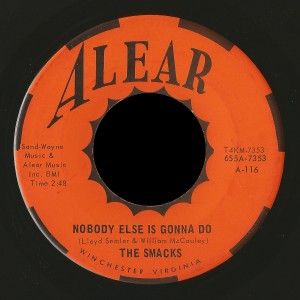George Daly, guitarist and songwriter for the Hangmen tells the story behind “Faces” with previously unpublished photographs.

The band had fans and it wouldn’t be too much of a stretch to say the Hangmen, at their zenith had a fan intensity that might have rivaled, in our home town, the early Beatles in Liverpool.
There on the Eastern Seaboard, mainly focused on DC and Maryland and Virginia, we played for the high and mighty such as Robert Kennedy and family, at Hickory Hill, multiple Foreign embassy balls, at many of the private girls schools, and wealthy DC homes, and even the fabled NOW Festival in the Adams Morgan area of DC, where Beat writer and great American poet Allen Ginsberg and I ended up talking music until 2am. The Hangmen played at a record store jammed with fans in Virginia where The Washington Post noted it and Cashbox, the music business trade magazines, wrote of the show as the performance turned into a riot involving over 2500 fans.
The Hangmen moved people.
At one point they told us we young men had by now a 1000+ person fan club. I eventually got in trouble with my landlord (and close to being evicted from my little Spring Street one-bedroom apartment) because of the continual lip sticking of the door and walls outside my place with “I Love George,” (heart) the Hangmen,” “We love You Dave,” and so forth – this went on for over a year till I moved to my anonymous next place.
So, we had fans. Passionate ones.

Faces, the song, first came to me one night, basically, all at once right after a gig in front of some of those screaming fans. Here’s how:
 With the gigs’ typical cheers, noise, music and intensity I had noticed a Maryland University junior in the audience, and she me. We talked briefly outside for a few minutes after the show shut down and then she followed my car home. An unexpected feeling came over me as I unlocked the door to my apartment, my new fan just two steps behind. We walked through the door with yet more lipstick graffiti on it, and I was embarrassed. But my new friend seemed almost giddy seeing what was scrawled on the door. As I turned on the lights, I thought, I don’t know my fans, and they don’t even care about that. No, wait! Plus they don’t know me, either. I suddenly got it all. Their excitement isn’t about George or Bob or Tom or Dave or Paul, it’s about the Hangmen. The image of the Hangmen, bad boys, rockers, musicians. And that dazed, glazed look on our fans’ faces that I was seeing around me at the gigs, was all misleading me. My song Faces arrived that night because I needed to express that feeling to the world.
With the gigs’ typical cheers, noise, music and intensity I had noticed a Maryland University junior in the audience, and she me. We talked briefly outside for a few minutes after the show shut down and then she followed my car home. An unexpected feeling came over me as I unlocked the door to my apartment, my new fan just two steps behind. We walked through the door with yet more lipstick graffiti on it, and I was embarrassed. But my new friend seemed almost giddy seeing what was scrawled on the door. As I turned on the lights, I thought, I don’t know my fans, and they don’t even care about that. No, wait! Plus they don’t know me, either. I suddenly got it all. Their excitement isn’t about George or Bob or Tom or Dave or Paul, it’s about the Hangmen. The image of the Hangmen, bad boys, rockers, musicians. And that dazed, glazed look on our fans’ faces that I was seeing around me at the gigs, was all misleading me. My song Faces arrived that night because I needed to express that feeling to the world.
And, yeah, Faces sounds cynical, world-weary, whatever, but it’s real, and there isn’t an artist alive who doesn’t stand on a stage with fans yelling for them, who doesn’t finally realize the world loves the symbol they’ve become, the world loves the outline, and doesn’t know, can’t really know the person making that music or playing that guitar or singing that song just from seeing them on stage. It can be disillusioning. “At 12 you’re young, at 1 you’re old.”
Back at my apartment, I turned to her and said “What’s your last name? You have to start somewhere.

I’m an optimistic person by nature, but that realization stuck. I saw those Faces again, all through three great bands where I was joined at the hip with Bob Berberich in the Hangmen, then the Dolphin with Paul Dowell and sometimes, Roy Buchanan and then Grin, with the incredible Nils Lofgren. And, even later, in the towers, recording studios, label offices, clubs and restaurants of the Hollywood major record label scene where I worked for 25 years after my time in those great born-in-DC bands. (Bob surpassed even our three great bands’ hat trick by singing and drumming, along with the great vocalist Joe Triplett, in Bob’s long-lasting DC band, The Rosslyn Mountain Boys.)
 And after these bands, out West I was no longer an artist (mostly), but had an outsized impact on artists with my time running A&R Divisions at Columbia Records, Elektra/Asylum Records and Atlantic Records. One of my artists at Columbia was the late, great Janis Joplin. One afternoon at the Topanga Canyon Corral bar (Southern Comfort on ice for her, me a bourbon sour) we had a long talk about the fickleness and unreality of fans’ perception of artists, Faces again. And about the isolation that comes from living only those shallow exchanges, without the souls talking. She lived that loneliness for a long time. But that afternoon we both laughed about it. Janis was a gem.
And after these bands, out West I was no longer an artist (mostly), but had an outsized impact on artists with my time running A&R Divisions at Columbia Records, Elektra/Asylum Records and Atlantic Records. One of my artists at Columbia was the late, great Janis Joplin. One afternoon at the Topanga Canyon Corral bar (Southern Comfort on ice for her, me a bourbon sour) we had a long talk about the fickleness and unreality of fans’ perception of artists, Faces again. And about the isolation that comes from living only those shallow exchanges, without the souls talking. She lived that loneliness for a long time. But that afternoon we both laughed about it. Janis was a gem.
But back to that night in my little Silver Spring apartment, the idea of the solitary artist, surrounded only by sycophants, robotic faces, no matter how nice and cheerful and desirous they might be, wouldn’t go away. And when I was alone again in my room with my old Silvertone acoustic guitar my Dad bought me years earlier, alone with my trusty yellow pad, the song, words and music appeared out of nothing but that feeling.

The next morning (other people’s mid-afternoon), I polished the song some more by picking up my ‘51 Fender Esquire guitar and plugging it into my amp. I fiddled around and found a grinding riff that was inspired by Mississippian John Lee Hookers, intensely repetitive and growling grooves. He was the famed bluesman whose LP I wore out back when I was learning to play the blues on the guitar, the blues being the God Father of all Rock ‘n Roll. So, I kept working on that guitar lick until the room was ringing and the words flowed effortlessly over the entire song. That’s the Faces you hear today, especially on the Monument 45 version with Dave Ottley’s intense and vivid vocals. It’s not a complicated song, but a deep one, and Dave really liked that and sung it that way, another important part of the magic in that music. It all came together with Faces, my band mates took that song, and once the drumming started, made it come alive. That’s why they call the people working together on music, a Band!
The thing about Bob was that he was kind of quiet and hard to tell what he was thinking, but when he engaged with you, he always went to the heart of the matter. That’s something hard to find in anybody, much less a band mate, so we became tight.
So, he and I came to understand each other. And, that day he liked the song, and pushed me to play it for everybody.

Amazingly, Bob found a handwritten draft of the Faces lyrics, probably something left on the band practice room floor. But back then, with those words and music, and with him liking it, I knew I had a truthful and powerful message. It was easy after that. Knowing that somebody besides me, my Hangmen bandmate, our drummer, got the message, and also lived the message himself, it all made me feel good. I wasn’t alone in seeing the difference between A Face and a friend. The difference between hollow acclaim and (in Bob’s case particularly) friendship that lasts a lifetime and isn’t star struck.
When his drumming was finally added to the mix combining with Tom’s always brilliant guitar playing, I was amazed how great it all felt. I still am.
A follow up note: A few years later I still had those anonymous stars & fans Faces thoughts on my mind. That was when I wrote a song with Boz Scaggs, Slow Dancer, that Columbia named Boz’s fifth major album after. My Faces anonymous-fan-meeting-you-after-the-gig line: “I never see your face in sunlight, moon light (night time) brings you straight to me. You never even got my name right. You were so easy to me.” That line in Slow Dancer spelled out the same thing as Faces expressed, so nothing really had changed.
But, ironically, with all the Faces who seemed so distant to me, just because of Bob, one fan at a gig finally did make a breakthrough, and it was straight to my heart.

The Hangmen played a big show at the Annapolis Armory. Between songs Bob yelled out my name and he pointed out a pretty girl near the front of the jammed and raving crowd. I was laughing with him, and he just used his drumstick to show me where to look, there’s even a picture of me looking at him off frame, grinning. I saw her blond hair and shining face, a feminine outline, so California. I leaned over to Bob after the song ended and said, pretty on edge, wow man, I’m going to marry that girl. I was 21.
Was I joking, I didn’t know. She and I talked after the set. And, she was… so normal, clear-eyed and very present and very real. And, I did marry her. That was the first time I saw Dale from San Francisco, who became Dale Daly. And, the best man at the $23 wedding in Las Vegas? Robert Berberich. You can’t make up the great lives Bob and I have lived. But that’s another tale, too. And involves the next two bands we were in, the Dolphin, then Grin with Nils Lofgren, Bob and me.
(My best man and I also spent a half a day in Jail in Virginia a few years earlier, our crime? Having long hair in 1964 and, after a gig, being on the road on a Sunday morning in deep southern Virginia. Bob’s Dad bailed us out!)
Those fans? Apart from the impossibility of getting close to them instantly, these were wonderful people who loved something they saw on a stage, and for whom I’m forever grateful. Most have disappeared into the dark fog of years. But there still are a few fans that turned out to be real, more than faces, ones that I still know and cherish today, probably more than they ever cherished the image of a Hangmen who had other thoughts in his mind. Someone like me, who couldn’t explain his feelings, except by writing a song.
© G. Daly 2023















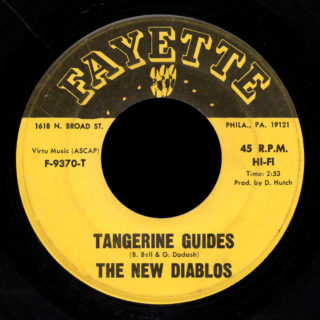
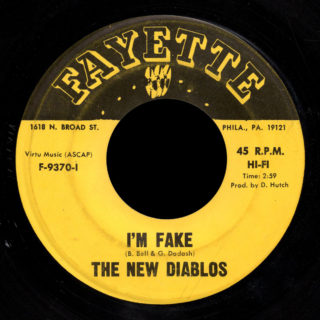

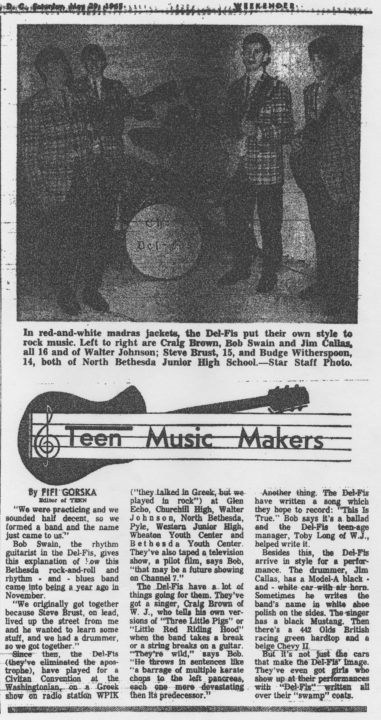
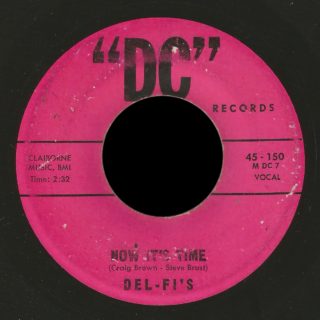
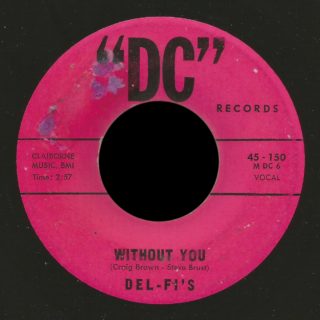

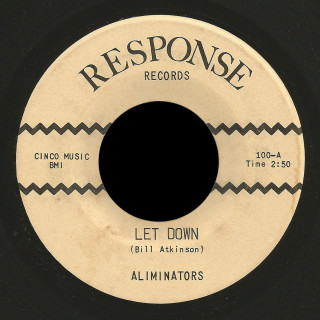
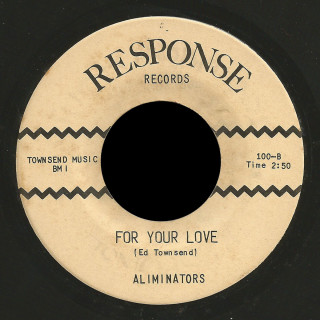

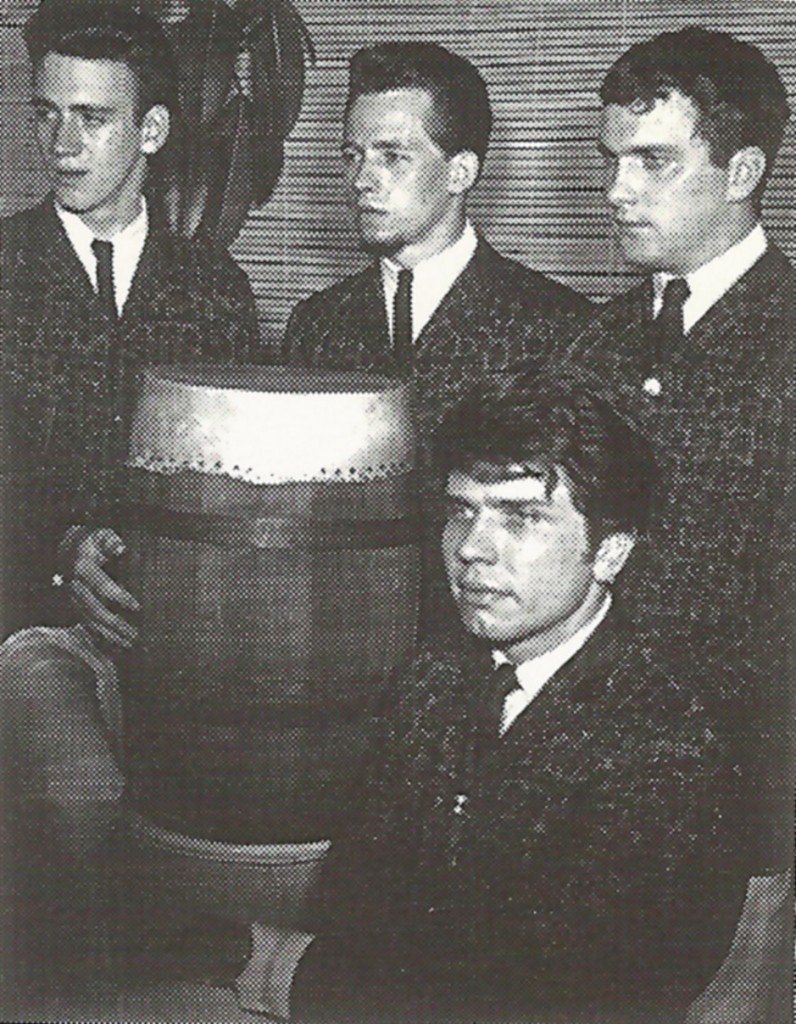 The Smacks h
The Smacks h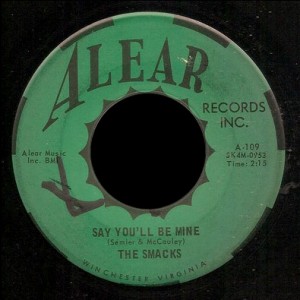 ad two primary members, Lloyd Semler from Hagerstown, Maryland, and Bill McCauley from Winchester, Virginia. Both towns are along the I-81 corridor, about 45 minutes drive apart. Other members include John Glosser on bass and David Hall on drums.
ad two primary members, Lloyd Semler from Hagerstown, Maryland, and Bill McCauley from Winchester, Virginia. Both towns are along the I-81 corridor, about 45 minutes drive apart. Other members include John Glosser on bass and David Hall on drums.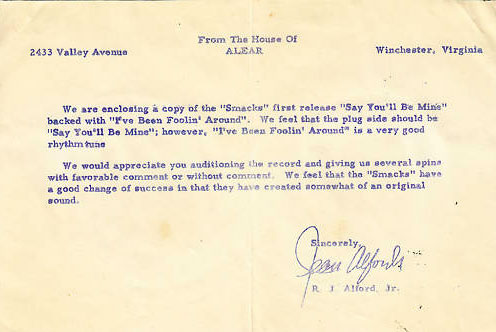
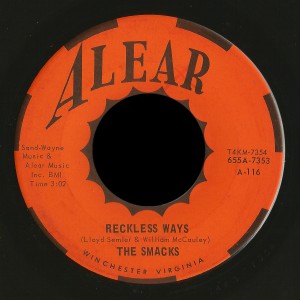 e liner notes to the excellent CD Aliens, Psychos & Wild Things, vol. 2, “Their first 45 was recorded at Accent Sound in Baltimore. The second was done in Harrisonburg at Weaver Sound in Spring ’66. The organist on ‘Nobody Else Is Gonna Do’ may be Front Royal’s soon-to-be-semi-famous, Roger Powell. The unreleased ‘There’ll Come a Day’ is the Smacks backing up two sisters from Winchester whose names are not recalled. Both Smacks discs came out on Alear, a Winchester label run by Jean Alford.” Front Royal is just south of Winchester.
e liner notes to the excellent CD Aliens, Psychos & Wild Things, vol. 2, “Their first 45 was recorded at Accent Sound in Baltimore. The second was done in Harrisonburg at Weaver Sound in Spring ’66. The organist on ‘Nobody Else Is Gonna Do’ may be Front Royal’s soon-to-be-semi-famous, Roger Powell. The unreleased ‘There’ll Come a Day’ is the Smacks backing up two sisters from Winchester whose names are not recalled. Both Smacks discs came out on Alear, a Winchester label run by Jean Alford.” Front Royal is just south of Winchester.